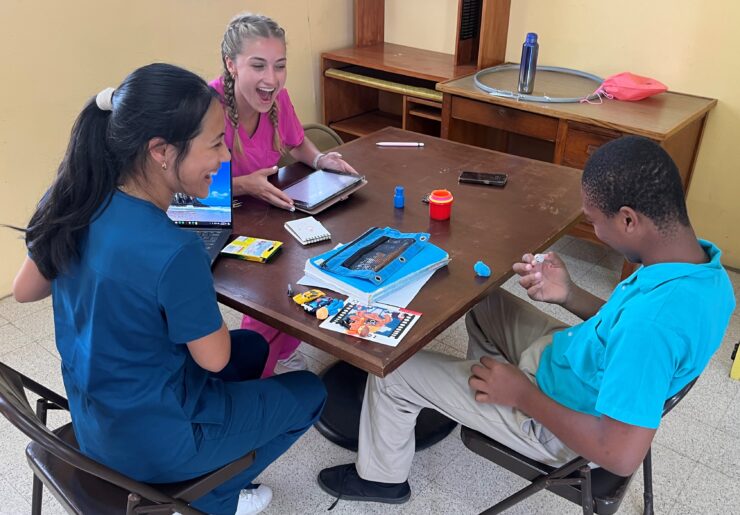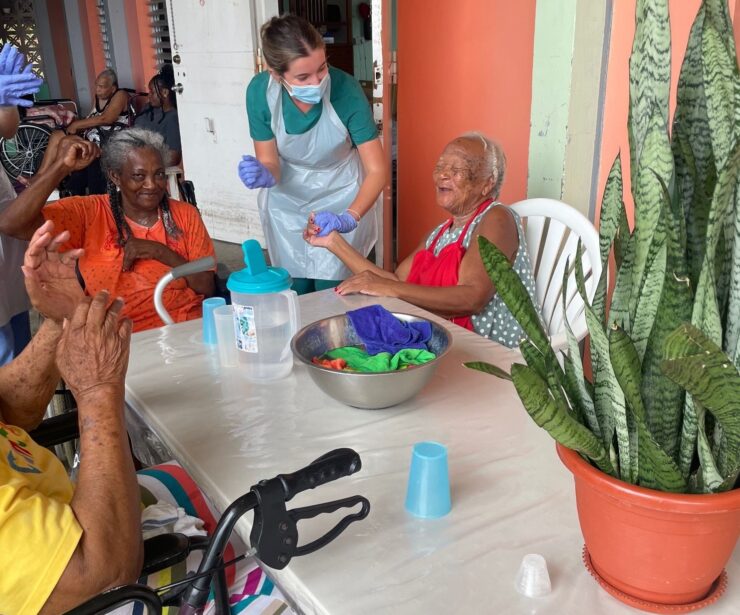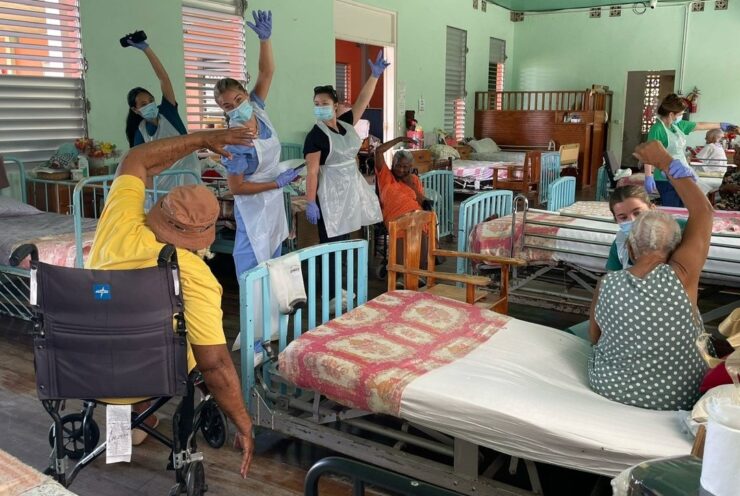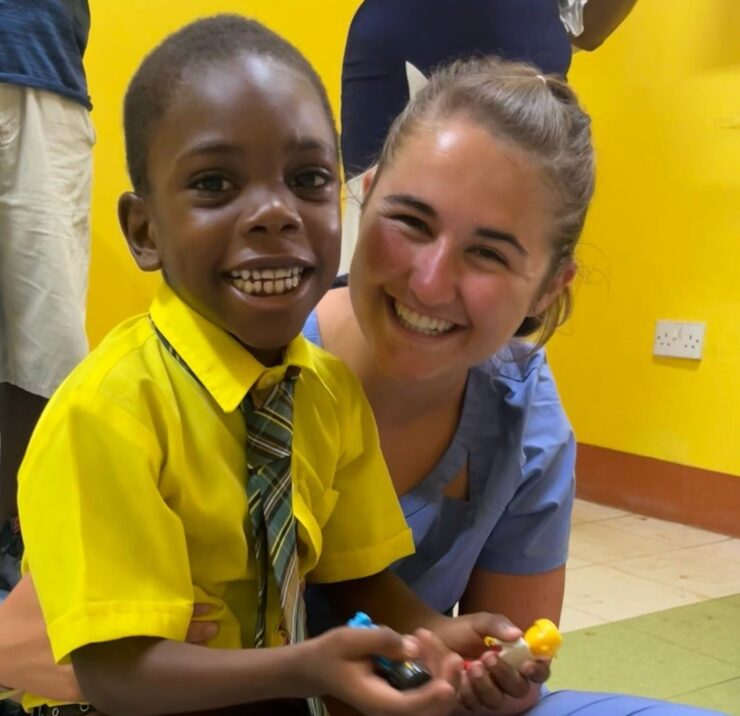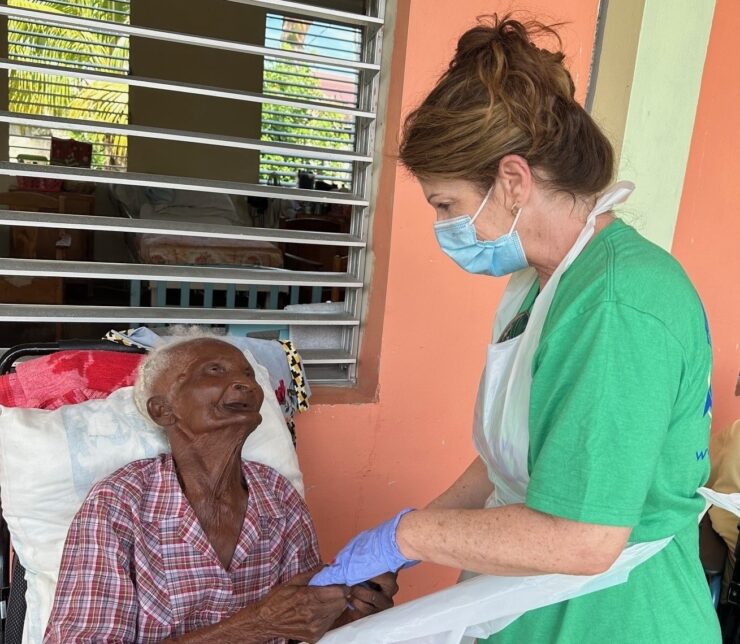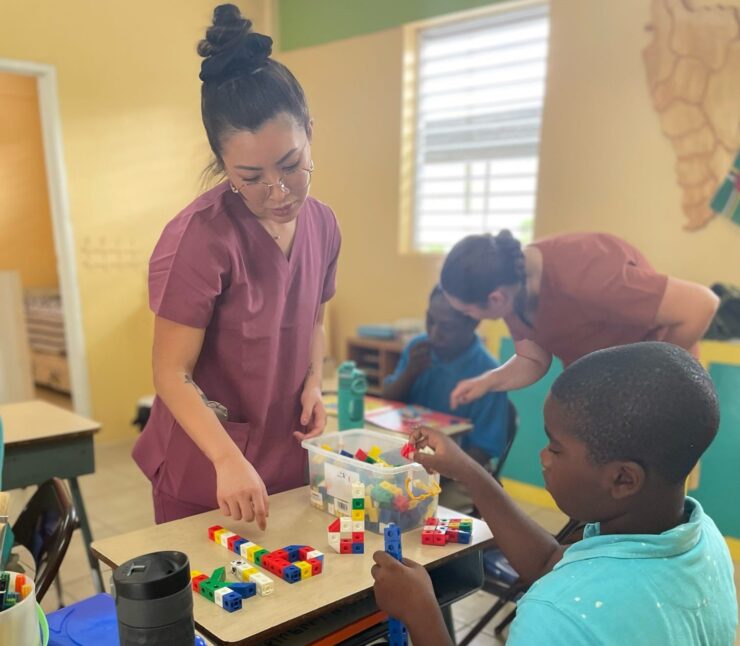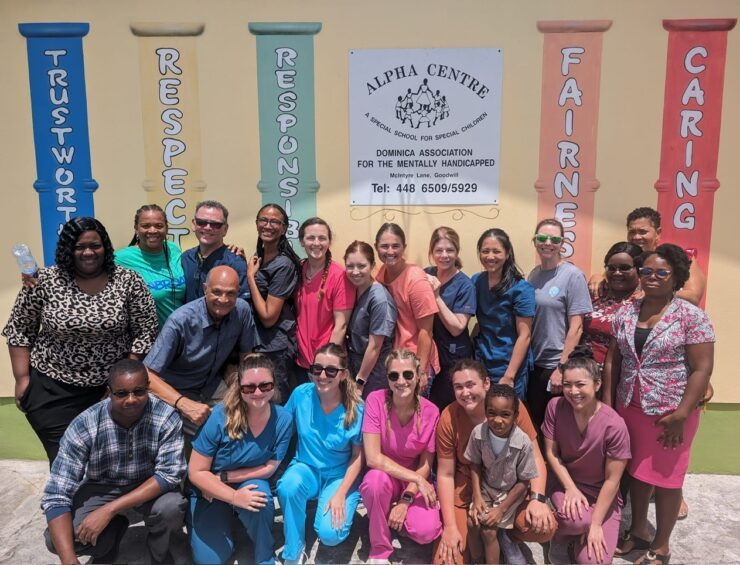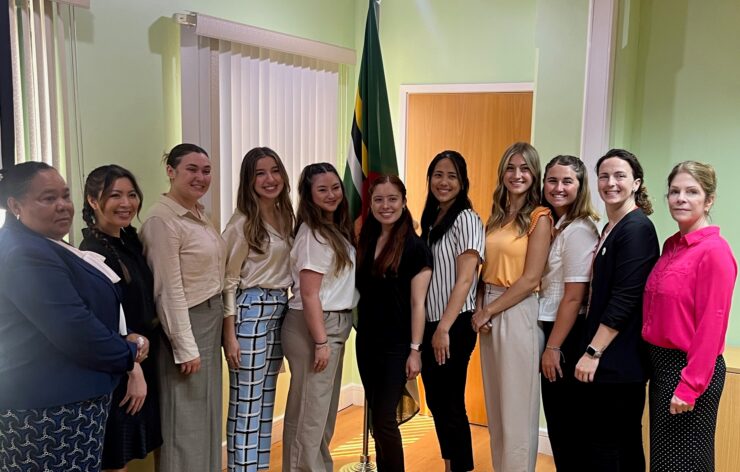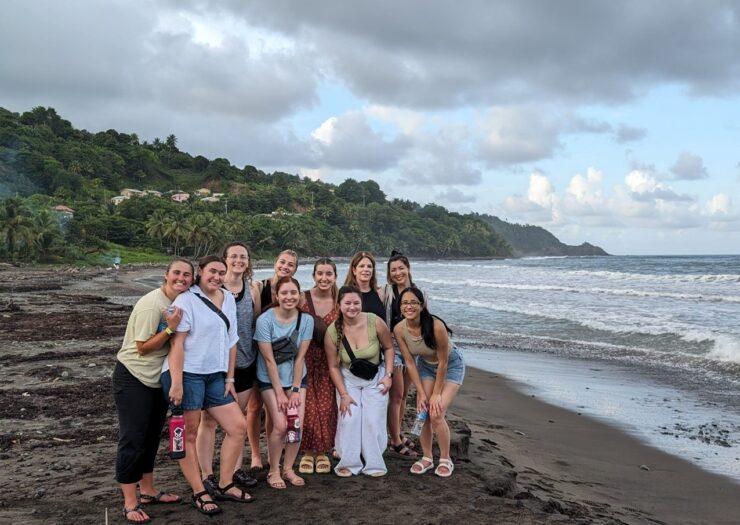Students and professors from Chapman University health science programs are sharing their expertise in two nations where those professions are developing from scratch.
Over spring break, eight communication sciences and disorders students and two faculty members traveled to the Caribbean island nation of Dominica, assessing people in schools and medical facilities.
“It changed my life,” says faculty member Lisa Lachance, who supervised the eight students on the trip.
Thousands of miles from the Caribbean, Chapman’s physical therapy department is contributing classroom footage to help educators in Ukraine and Tajikistan.
“Chapman has a global emphasis and mission and one of our goals is to be good global citizens,” says physical therapy Professor Alison McKenzie.
Speech Language Therapy in Dominica
The speech language pathology students, Lachance and Assistant Professor Leah Beekman went to Dominica through an organization called Therapy Abroad, which sends health professionals and students to work overseas. It was the Chapman speech language program’s first time in the country, although Beekman had worked abroad before, most recently in Belize last year.
“In Belize we went in and did therapy—that’s not how Dominica was. We had to tell them what we did and what speech language therapy was because that kind of resource doesn’t exist here,” says Beekman, Ph.D.
Dominica, which is southwest of Puerto Rico and in the middle of a chain of islands that includes the Virgin Islands, St. Kitts, St. Lucia and Barbados, is recovering from 2017’s Hurricane Maria and the COVID-19 pandemic.
“The government said, please come help our people,” Lachance says.
The group assessed people in medical facilities, schools and homes, met with the acting prime minister, a senator and a member of parliament, and experienced the country’s culture and natural beauty. Beekman took students to schools and Lachance took them to an assisted living facility for older people, where facilities appeared to be from the 1950s.
The faculty and students were most affected by personal interactions with people they met. Lachance recalls when a student played music from her phone at a facility for older people and students led chair yoga and stretching.
“They literally came alive. All they want is someone to pay attention to them,” Lachance says.
Avory Leander (MS ’25) wrote a journal entry about her experience on the flight home. Several encounters stayed with her.
“A little boy with Down syndrome played and danced with us. The homeless adults at the infirmary shared their stories with us … One of the residents (at the infirmary) is blind. I helped her follow along with yoga and she laughed with each step,” she says.
A man bedridden with cerebral palsy used a touchpad to navigate his TV. The students downloaded an augmentative and alternative communication (AAC) app to his TV “and we gave him a voice,” Leander says.
“The first question we asked him was how he was feeling. He moved the cursor to ‘happy.’ At 47 years old, he got to hear himself say ‘happy’ for the first time … We all cheered. We all cried. He smiled wide.”
“This trip has completely explained why we do what we do,” she says.
Mai McClintock (MS ’25) concurred.
“It was deeply motivating to see the small but meaningful impact we made in a short amount of time with each client,” she says.
Mackenzie Yan (MS ’25) says it was both challenging and fulfilling to visit a place she knew very little about and adapt to the needs and culture of each person.
Brooke Magill (MS ’25) says the most moving aspect of the trip was the people themselves.
“They made me feel at home from the moment I arrived,” she says. “Their resilience, optimism, and unwavering spirit in the face of adversity was truly inspiring.”
Beekman says the trip also gave students experience thinking outside the box and writing reports quickly, while also learning from the people they helped.
“It really enhances their clinical writing skills and teaches them what can’t be taught in a classroom,” she says.
Students worked with an occupational therapist and two other speech language pathologists who live in the Virgin Islands.
“It was good for our students to see that they can practice anywhere because they have their degree,” Beekman says.
Lachance says the students took care of each other despite the heat and long days. It was one student’s first time out of the country.
“That speaks to the caliber of our students,” Beekman says.
Word spread about the group, and people asked them where they would be the next day, she says. When they went to a school, “we had a long line of high schoolers,” she says.
Magill says each encounter was “not just an assessment but an exchange of stories, experiences, and perspectives that left a lasting impact on both me and those I worked with.”
Those exchanges included snorkeling and seeing waterfalls, and a night of cultural food and dancing.
“There is so much vibrancy and color everywhere you look … it is something I will never forget,” Yan says.
Beekman and Lachance plan to take students abroad next year, destination to be determined.
PT Education in Ukraine and Tajikistan
On the other side of the world, Chapman physical therapy faculty got involved this year with PT education in Ukraine, with the goal of developing resources for Tajikistan—which borders Afghanistan, China and other former Soviet republics.
Chapman faculty got involved through former faculty member Marcia Greenberg. Greenberg has worked for more than a decade with Momentum Wheels for Humanity, a nonprofit that works with people with disabilities around the world. Greenberg introduced a version of Chapman’s stroke boot camp in El Salvador during her training of physical therapists. She developed teaching resources for PTs in Ukraine that have been ongoing since 2015. Part of Momentum’s current project, which is funded by USAID, is to develop an entry-level physical therapy program in Tajikistan.
One day over lunch in the Orange Circle, Greenberg told McKenzie that one challenge in Tajikistan’s PT education is a heavy reliance on lectures, even for hands-on clinical courses.
“So I suggested that we show them how we do it at Chapman—i.e. integrating lab and ‘lecture’ so that students can learn to apply and practice what they are learning while getting feedback from faculty,” says McKenzie, DPT, Ph.D.
She began working with Greenberg and Momentum to share videos of Chapman classes with Republican Medical College in Tajikistan. The material will augment training materials developed by World Physiotherapy to help create the equivalent to an associate’s degree PT program, Greenberg says.
“The goal is to enhance PT education and practice in Eastern Europe, while the international educators learn more about the local culture and customs,” McKenzie says.
The Chapman material includes footage and practice management courses, where students learn to evaluate and treat different diagnoses. Once educators are trained, they can teach their peers and then students, McKenzie says.
Audio of the Chapman classes will be translated into Russian, which is spoken by most faculty Tajikistan, and Tajik, spoken by many younger people like students. She and her collaborators from World Physiotherapy hope this will form a framework on which the PT school in Tajikistan can build their own program.
“They’re pretty much starting from scratch there,” she says. “We want to tailor whatever we do to be appropriate for their culture.”
Greenberg says graduates of the program will be the “pioneers of the profession” in Tajikistan. Work on the program also dovetails with the World Health Organization’s Rehabilitation 2030 initiative, which supports incorporating rehab into the health care of all countries.
“With the support of Chapman, they can see where they’re headed,” Greenberg says. “It’s a really big help and we appreciate that Department Chair Shawn Farrokhi and the whole faculty have been so supportive.”
For students interested in practice experience abroad, the department usually offers a clinical rotation in Italy.
